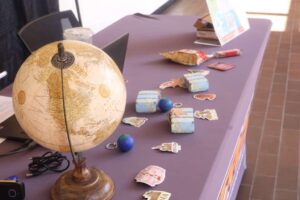

UTRGV International Students Abbas Ali, Ashrafuzzaman Nazim and Lea Karren shared their experiences during the pandemic.
Ali, Nazim and Karren experienced lockdowns and COVID-19 regulations in their home country. Now, they’re living in the pandemic in America.
Mass Communication sophomore and tennis athlete Karren is from Pont l’Abbé, a city on the west coast of France. She moved to the U.S. to pursue a student-athlete career and has become the first of her family to do a four-year education in America.
Her tennis career enabled her to become an independent woman.
Karren was in France when the pandemic hit.
“It was just like, even getting groceries, it was only one person was able to get groceries, and everybody had to stay home, we couldn’t go out in our street, we couldn’t do nothing, then, the cops were looking at us, and make sure we were respecting the rules, that was, end of Feb to July.”
Karren decided to continue her career in America by enrolling at UTRGV in August 2020.
Amidst the pandemic, Karren has grown closer to her tennis team and gained a new outlook on life.
“Now I have more, like the mindset of living day by day, and like, give your 100% everyday and you will see what happen[s]… So, I feel like, I’m more on that mindset, more grateful, of course, grateful. I think that’s like the most important thing that happened to me with the pandemic.”
Civil Engineering graduate student Abbas Ali and Disaster Studies graduate student Ashrafuzzaman Nazim are from Dhaka, Bangladesh. According to Nazim, the city is home to 30 million people. This made it difficult to social distance according to Ali.
Ali and Nazim were accepted to UTRGV before COVID-19, but the pandemic deferred their enrollment to Spring 2021.
Nazim shared his view of Bangladesh and America in the pandemic.
“In Bangladesh, it’s one of the crowded country, it’s not like double up like U.S.A….there’s like 15 or like 10 million people more or less, they’re low-income. They had to go out to maintain their, to survive their family, they’re deliverer, taxi-driver, daily worker. The government has not enough fund to locate them during the pandemic. Here, if you don’t work, the government, will subsidize you, and the government will give you some fund, to live with your family. So, situation here is easier, situation there is difficult, in terms of economic condition, in terms of population, in terms of culture.”
Despite the difficulties brought by the Pandemic, Ali, Nazim and Karren are motivated to continue to seek higher education at UTRGV.
This is Carla Landaverde with Vaquero Radio



